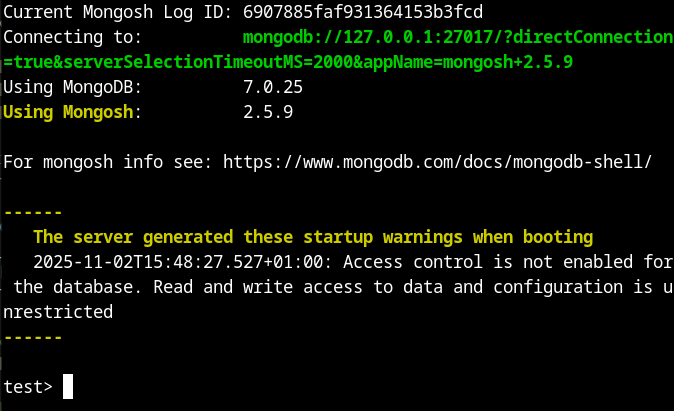MongoDB in Fedora Linux – how is the configuration of the server
Mongoshell
The MongoShell is an interactive command window for the MongoDB database. You can use it for the CRUD operations. The MongoShell comes with the installation of MongoDB. After test, you type in the commands.

What is CRUD?
Create, Read, Update, Delete
The command for the MongoShell
mongosh
It is possible that you see this message, but you can ignore it:
and type the command:
db.serverCmdLineOpts()
The output is in the JSON (JavaScript Object Notation) Format.
test> db.serverCmdLineOpts()
{
argv: [ ‚/usr/bin/mongod‘, ‚-f‘, ‚/etc/mongod.conf‘ ],
parsed: {
config: ‚/etc/mongod.conf‘,
net: { bindIp: ‚127.0.0.1‘, port: 27017 },
processManagement: { timeZoneInfo: ‚/usr/share/zoneinfo‘ },
storage: { dbPath: ‚/var/lib/mongo‘ },
systemLog: {
destination: ‚file‘,
logAppend: true,
path: ‚/var/log/mongodb/mongod.log‘
}
},
ok: 1
}
Description
‚/usr/bin/mongod‘, ‚-f‘, ‚/etc/mongod.conf‘ = The server has been started and committed to the config file of MongoDB.
config: ‚/etc/mongod.conf‘, = this is the path to the config file
net: { bindIp: ‚127.0.0.1‘, port: 27017 } = The server cannot be reached from outside
storage: { dbPath: ‚/var/lib/mongo‘ } = here are the database files are saved
path: ‚/var/log/mongodb/mongod.log‘ = where are the log files are saved
processManagement: { timeZoneInfo: ‚/usr/share/zoneinfo‘ }, = where is the time zone saved.